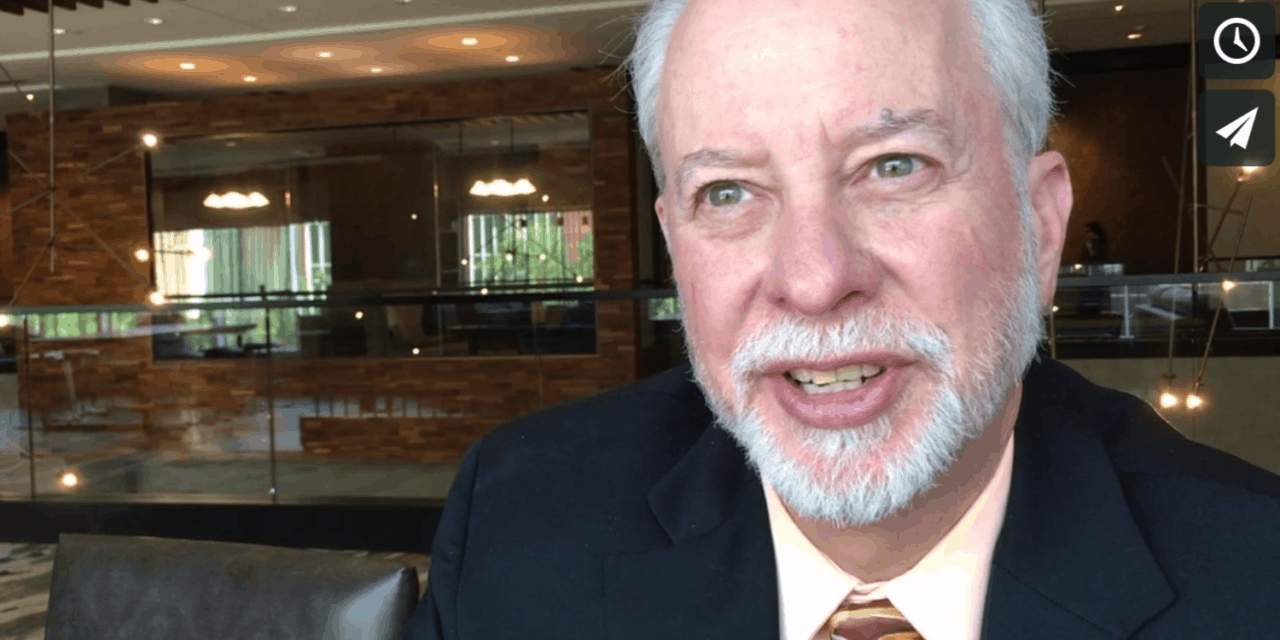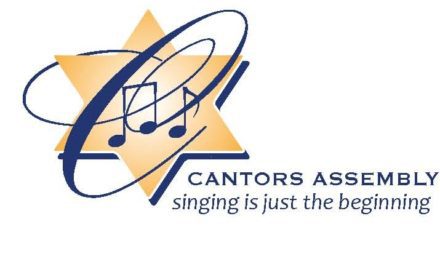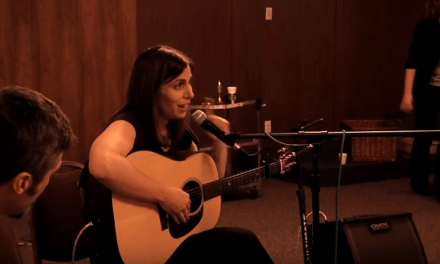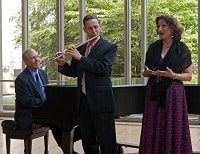Rabbi Cantor Jeffrey Myers has been offered a number of awards since tragedy struck his Tree of Life/Or L'Simcha Congregation in Pittsburgh, and he has turned all of them down...except one. The only award he grudgingly accepted is an award from his own colleagues in the Cantors Assembly, who honored his one-of-a-kind service with the specially created Kol HaNeshamah Award at the recent CA convention in Louisville, KY.
The words below are from the address he gave upon accepting the award. The accompanying video is from a subsequent conversation I was fortunate enough to have with him.
(Note: for ease of formatting for this blog, the Hebrew text has been removed. If you'd like the complete version of his remarks, please write to communications@cantors.org.)
Address to Cantors Assembly, May 21, 2019
Tehilim have always been precious to me, even more so since October 27. I find myself reciting the opening to Psalm 121 every hour of every day:
“I lift my eyes to the hills; from whence shall my help come? My help comes from God, Maker of heaven and earth.”
But what to open with this morning? Here is my answer: Psalm 116.
“I am filled with love, for indeed, Adonai heard my pleading voice, turned an ear to me, in the day I called out. Though the pangs of death embraced me, and the earth’s deep sought me out, though I met trouble and pain, I called upon the name of Adonai: “Please, Adonai, save my life!...You have saved me from death, my eyes from tears, my feet from stumbling; I shall walk in God’s presence in the land of the living.”
Steve Stein*...I even wrote my remarks down!
I say this tongue in cheek, because on the Shabbat following October 27, we held a unity service, and I had left the sanctuary a total wreck, for at 9:52 AM, we held 1 minute, 11 seconds of silence, and I could not stand, but collapsed in my chair inconsolable. I met Steve, who came into town to mourn as a native Yinzer [Pittsburgh native], and just to be there to support me. I had no time nor composure to draft seven eulogies and the D’var Torah. God directed my tongue, and I never wrote anything down. I’ve tried to when I can now for posterity’s sake, and for something to present to my grandchildren, if so blessed. So I wrote this down. Thank Steve. [*Steve Stein is the Executive Vice President of the Cantors Assembly.]
Who could ever think that you would be put in a position where you tell the 911 officer that you think you hear footsteps, take a moment to pause to quietly recite the Sh’ma and Viddui, and ask God to make it quick, debating in your mind if you hang up on your only lifeline to the outside and possible safety to record a farewell video to your wife and children?
I stand before you humbly, undeserving of an award, and many have been proffered me. I debated with [Cantors Assembly President] David Lipp several months ago about this. In the end, if there is any consolation, being honored by one’s colleagues is the highest honor one might achieve, and so I thank you. As Ivan Perlman, z”l, a past president used to say: “I love you all dearly”.
Who could ever think that you would be put in a position where you tell the 911 officer that you think you hear footsteps, take a moment to pause to quietly recite the Sh’ma and Viddui, and ask God to make it quick, debating in your mind if you hang up on your only lifeline to the outside and possible safety to record a farewell video to your wife and children? Ultimately, God answered me. “Jeffrey, it’s not your time. I have things I need you to do. I sent four seraphim, in the guise of a SWAT team, to rescue you.”
I stand before you today God’s humble servant, just trying to do my best. There is no rabbi I can call who went through this previously, thank God. I know that in the days, weeks and months since, so many of you have reached out to me, and continue to do so, and I am grateful for your hizzuk and nichum. If I have not responded, forgive me; it is at times overwhelming.
I want to share with you a story about the power of music, for if there is one group that understands this, it will be all of you, and I have not shared the intimate details ever. With a week of funerals, there were five different sheloshim dates, as well as two communal sheloshim events. The first one was Monday evening, November 26, organized by the Jewish Federation of Greater Pittsburgh. I was asked to chant yet again a Malei, and didn’t know if I had any more in me. I somehow got through it.
I met one of the first officers on the scene who was shot, Officer Michael Smidga, delighted that he was recuperating, and warmly embraced one of my heroes. We spoke for quite a bit, but as I drove home, I asked God when my sheloshim would end, as I felt numb, cold and empty. The following evening, the Pittsburgh Symphony offered a sheloshim concert of healing and hope, which has been re-broadcast on PBS stations throughout the nation.
Then Maestro Manfred Honeck signaled a percussionist to strike a tubular bell. Once, then again, then again. I thought to myself: Oh no, he’s going to sound it eleven times.
I had the privilege of asking the attendees to rise for a first, the recitation of a Mourner’s Kaddish in Heinz Hall, following the performance of Ravel’s “Kaddish”. I returned to my seat, empty. The last piece was performed, and although the evening’s performance was beautiful and moving, I repeated the same question to God from the previous evening: When does my sheloshim end?
Then Maestro Manfred Honeck signaled a percussionist to strike a tubular bell. Once, then again, then again. I thought to myself: Oh no, he’s going to sound it eleven times. Although I thought that my tear ducts could not keep up with the daily demand, the flood gates poured out once again. I stared at the florid pattern of the wallpaper, and the pattern drew my gaze slowly upward – five, six, seven, eight. “Please God, I beg You, take away my pain. It’s too much to bear! Your humble servant beseeches You.” Nine, ten, eleven. I just stared upward as I drowned my tuxedo.
As the final sound dissipated, and as I continued staring upward, I slowly felt this immense weight gently ease off of my shoulders, as though invisible hands lifted the weights off. I felt God’s presence as He personally lifted me out of my sheloshim and eased my burden. I quickly left the stage to compose myself, seeking a wall to hold me up.
The stage manager tried to quickly usher me and the three other participants to the front of the stage for applause, which I really did not want to do, but did so anyway. I embraced Maestro Honeck, and thanked him, as his baton was the etzbah Elohim for me that evening.
That, my dear colleagues, is the power of music in the simple sounding of a tubular bell. Whenever you doubt the power of music, perhaps my personal story might encourage you. When I had the opportunity to meet Yitzhak Perlman afterwards, and went to introduce myself and say how honored I was to meet him, he cut short my introduction by saying that he knew who I was, and was so honored to meet me. Wow.
One of the many things that I have learned is that one need not have been inside the Tree of Life to become a victim.
Some wonder how I could find faith amidst my horror. Some might think that I’ve totally lost it. On the contrary, I found it. I’ve always had a deep, abiding faith, and God’s presence in my life has strengthened it. I never could fully understand the true challenge to one’s faith that was the Holocaust, but now I get it. I understand why people lose their faith, and why people gain in their faith, as not only can I tell my story as a Federal victim and survivor, but I fully comprehend the experiences of other survivors as well as the various layers of victimhood.
One of the many things that I have learned is that one need not have been inside the Tree of Life to become a victim. All of my congregants, as well as the congregants of the two other congregations that we house, are victims. The Jewish community of Pittsburgh are victims. I heard it from the mouths of members of the Greater Pittsburgh Rabbinic Association, that all of the rabbis are victims. All of Pittsburgh are victims. The entire Jewish community throughout the world is a victim. That includes all of you, dear colleagues, anyone watching this live stream, and your congregants. Americans and people from around the world are victims.
How do I know this? We have received probably more than 30,000 pieces of mail. I’ve tried to read all the ones addressed to me, as well as thousands upon thousands of emails, and the language is the same. Everyone who writes is a victim. I would not begin to offer mental health advice, but if you don’t have connections to the mental health community, make them.
So what now? Where do we go from here? While I would never have expected to know, speak with and learn from the President of the United States, the Prime Minister of Israel and cabinet ministers, the Israeli ambassador, Ambassadors from Saudi Arabia, Egypt and many other nations, the governor and attorney general of Pennsylvania, the FBI field office director, the US attorney, the mayor of Pittsburgh, its chief of police, zone commanders, countless officers and emergency personnel, and mental health professionals, just to name drop a few of my friends, I offer the following for your consideration:
- Emergency Plan. Your synagogue must have one, to deal with fire, bomb threat, storms and active shooter scenarios.
- Walk Through. Law enforcement will do a walk through with you, frequently together with DHS and/or FBI, to identify security challenges and possible solutions, such as exits and entrances, outdoor lighting, video, alarms, etc. Here is not the time to debate the pros and cons. You know my answer. It’s not 1962. Just do it.
- Our Neighbors. We don’t know our neighbors very well, as many Americans exist in stand-alone silos, with no bridges. As one who lives in Mr. Rogers Neighborhood, I can unequivocally speak to the value of knowing our neighbors, as people of various faiths and colors continue to reach out to us. Create 101 Religion courses with interfaith partners. Create a shared music concert amongst choirs. Bicycle ride to different houses of worship on different days. Sponsor an iftar. There is so much more.
- Some of our people are afraid. We need to talk about it. Connect with the mental health community and hold conversations.
- The best way to conquer the "H" word in this world is by doing more good. Grow your adult education offerings with Hebrew for the Rusty, Bible for the Dusty and Prayer Skills for the Musty. Help our people reconnect. Let them help you reconnect.
- Self: don’t assume that you are okay. Seek out an appropriate mental health professional for a check-up. Even if you turn out to be okay, I’d rather be wrong with this suggestion, than not say anything and sadly be right. Besides, the normative stressful role of a clergyperson is quite a bit for any of us to handle.
I wish to end with a piece of personal Torah that came to me recently. I have yet to find a source to offer it B’shem Omro. If you recognize a source, kindly let me know. As I mentioned at the beginning of my remarks, the Psalms continue to uplift and inspire me. King David put to quill his innermost thoughts in such a real way that 3,000 years later, they resonate with me and help me. We read in Psalm 30:
“God, You raised me up from Sheol, You gave me life and did not let me descend into the Pit.”
At the last two stanzas we read:
“You turned my mourning into a dance for me, You undid my sackcloth and girded me with joy – that I might sing of Your glory and not be silent: Adonai my God, I thank You, always.”
Well, I cannot stand here today and say that my mourning has been transformed into a dance, nor my sackcloth has been removed, for that has not happened yet. However, I call your attention to the careful word choice near the end. Note that Kind David wrote, "So that I might sing of Your glory and not be silent."
He could have written "So that I might speak of Your glory" but he didn’t. That is because he is talking to us Hazzanim. We have the Divine gift of song, and we are the ones to sing of God’s glory and not be silent. That is our calling, our command, and our responsibility, and after all of this, I will not be silent.
"Oh Lord, my God, I will give thanks to thee, forever."
I thank You God, and I thank you, my dear colleagues.




